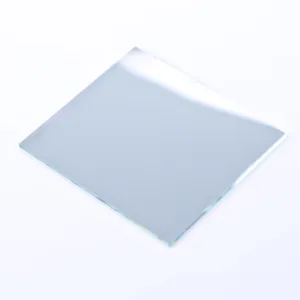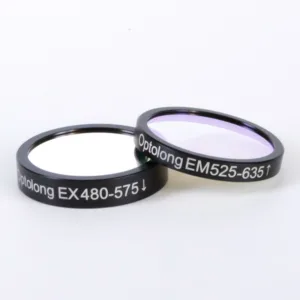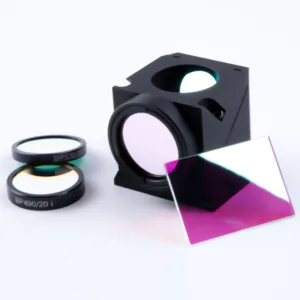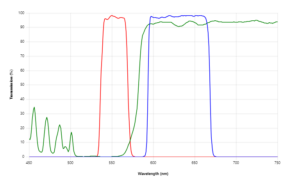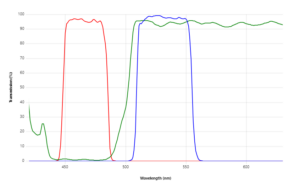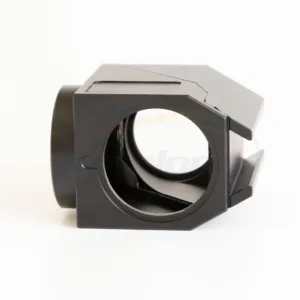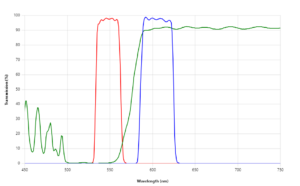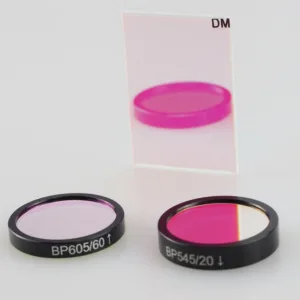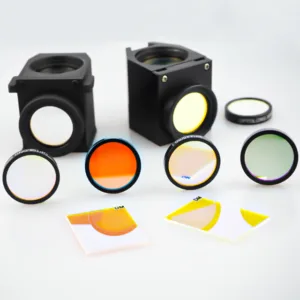-
What are Beamsplitters?
Beam splitters are optical components used to split incident light into two separate beams at a designated ratio.
Beam splitters are very common optical components which can be used for different applications, such as interferometer, autocorrelation,camera,photographic,laser systems,illuminator systems,spectrometer systems and so on. …
Read More -
What Type of Excitation Filter to Use?
Introduction The quality and precision of your experiments or observations might be considerably affected by the excitation filter you use. In order to selectively transmit desired light wavelengths while blocking undesirable wavelengths, the excitation filter is essential. We will delve into the world of excitation filters in this post and examine the variables to take …
Read More -
What are the Essential Filter Sets for Fluorescence Microscopy?
Introduction Fluorescence microscopy is a potent instrument that may be utilized in a variety of scientific fields to observe and analyze biological samples with exceptional sensitivity and resolution. The usage of filters, which is one of the essential elements of fluorescence microscopy, is essential for separating the excitation and emission light. We will examine the …
Read More -
Texas Red Fluorescence Spectrum: Increasing Precision and Clarity
Fluorescence microscopy has transformed the area of biological imaging by enabling researchers to clearly see and analyze complex cellular processes. The emission filter, a key element that is essential to improving clarity and precision, is at the core of this imaging approach. We shall examine the role of emission filters in fluorescence microscopy, how they …
Read More -
What Are Fluorescence Filters?
In the fields of optics and imaging, fluorescence filters are essential. They are crucial elements that are utilized to shape and regulate light in order to improve fluorescence signals and lessen undesired background noise. We shall delve into the intriguing world of fluorescence filters in this article, including their function, varieties, and uses. Explore the …
Read More -
Can I See Microscope Filter: Investigating the Amazing Phenomenon
Introduction We’re glad you’ve found our in-depth resource on “Can I see Microscope Filter.” In this post, we’ll dig into the fascinating world of tomato fluorescence and consider how a Texas Red filter may be used to observe this phenomenon. This page will give you useful information and answers to frequently asked questions, whether you’re …
Read More -
Tritc Filter: Fluorescence Imaging Improvements for Scientific Research
Introduction We’re glad you’re here to learn more about Tritc filters and how they can improve fluorescence imaging for scientific research. In this essay, we will explore the world of Tritc filters, including their uses, advantages, and contributions to the development of numerous academic disciplines. This article will educate you on Tritc filters and their …
Read More -
Will CY5 Filter Cube Work with Ethidium Homodimer-1?
Introduction In the realm of fluorescence microscopy, researchers often encounter various fluorescent dyes and staining agents that enable visualization of specific cellular structures or processes. When choosing compatible components for fluorescence imaging experiments, it is crucial to ensure that the filter cube used matches the spectral characteristics of the fluorophore. In this article, we will …
Read More -
How Fluorescence Imaging Filters Work?
Fluorescence imaging filters are essential for getting clear, accurate photographs of fluorescence. These sophisticated filters are frequently employed in imaging techniques and scientific studies. We will go into the operation of fluorescence imaging filters in this blog article, examining their significance and how they advance scientific understanding. Introduction Fluorescence imaging is a potent method that …
Read More -
What Does a Texas Red Filter Show: Exploring Its Applications and Benefits
Have you ever wondered what a Texas Red filter is and what it can reveal? In this article, we will delve into the world of Texas Red filters, their uses, and the valuable information they can provide. Whether you are a scientist, photographer, or simply curious about this optical tool, we will unravel the mysteries …
Read More

